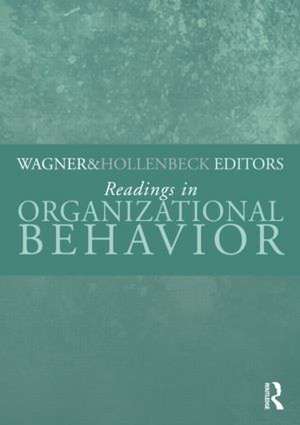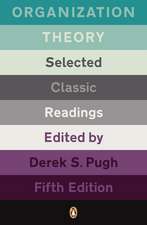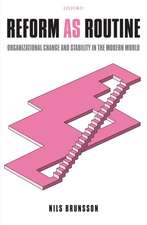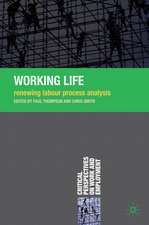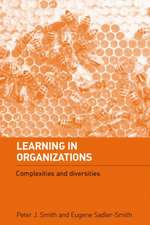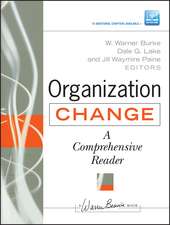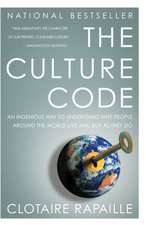Readings in Organizational Behavior
Editat de John Wagner III, John Hollenbecken Limba Engleză Paperback – 27 oct 2009
| Toate formatele și edițiile | Preț | Express |
|---|---|---|
| Paperback (1) | 313.28 lei 6-8 săpt. | |
| Taylor & Francis – 27 oct 2009 | 313.28 lei 6-8 săpt. | |
| Hardback (1) | 696.14 lei 6-8 săpt. | |
| Taylor & Francis – 27 oct 2009 | 696.14 lei 6-8 săpt. |
Preț: 313.28 lei
Preț vechi: 363.58 lei
-14% Nou
Puncte Express: 470
Preț estimativ în valută:
59.97€ • 65.16$ • 50.40£
59.97€ • 65.16$ • 50.40£
Carte tipărită la comandă
Livrare economică 21 aprilie-05 mai
Preluare comenzi: 021 569.72.76
Specificații
ISBN-13: 9780415998505
ISBN-10: 0415998506
Pagini: 618
Ilustrații: 42 tables and 30 line drawings
Dimensiuni: 174 x 246 x 36 mm
Greutate: 1.11 kg
Ediția:1
Editura: Taylor & Francis
Colecția Routledge
Locul publicării:Oxford, United Kingdom
ISBN-10: 0415998506
Pagini: 618
Ilustrații: 42 tables and 30 line drawings
Dimensiuni: 174 x 246 x 36 mm
Greutate: 1.11 kg
Ediția:1
Editura: Taylor & Francis
Colecția Routledge
Locul publicării:Oxford, United Kingdom
Public țintă
ProfessionalCuprins
1. Organizational Behavior 1. Assessing the ‘Conventional Wisdoms’ of Management for the 21st Century Organization Michael Harvey and M. Ronald Buckley 2. Management and Managers 1. How to Detect a Management Fad—and Distinguish It from a Classic Danny Miller, Jon Hartwick, and Isabelle Le Breton-Miller 3. Managing Diversity and Individual Differences 1. Stereotype Threat at Work L. Roberson and C.T. Kulik 2. Implications of Methodological Advances for the Practice of Personnel Selection: How Practitioners Benefit from Meta-Analyses H. Le, I.S. Oh, J. Shaffer, and F. Schmidt 4. Reception, Decision Making, and Creativity 1. Error Reporting in Organizations B. Zhao and F. Olivera 2. The Effects of Personal and Contextual Characterstics on Creativity: Where Should We Go From Here? C.E. Shalley, G. Zhou, and G.R. Oldham 5. Work Motivation and Performance 1. Relational Job Design and the Motivation to Make a Prosocial Difference A.M. Grant 2. Integrating Theories of Motivation P. Steel and C.J. Konig 6. Satisfaction and Stress 1. Why Does Affect Matter in Organizations B.G. Barsade and D.E. Gibson 2. Advances in Occupational Health: From a Stressful Beginning to a Positive Future M. Macik-Frey, J.C. Quick and D.L. Nelson 7. Efficiency, Motivation, and Quality in Work Design 1. Work Redesign and Performance Management in Times of Downsizing Evangelista, A.S. and Lisa A. Burk 2. Relational Job Design and the Motivation to Make a Prosocial Difference Grant, Adam M., (2007) 8. Interdependance and Role Relationships 1. Team Implicit Coordination Processes: A Team Knowledge-Based Approach R. Rico, M. Sanchez-Manzanares, F. Gil, and C. Gibson 2. The Management of Organizational Justice R. Cropanzano, D.E. Bowen, and S.W. Gilliland 9. Group Dynamics and Team Effectiveness 1. Group Learning J.M. Wilson, P.S. Goodman, and M.A. Cronin 2. Team Effectiveness 1997-2007: A Review of Recent Advancements and a Glimpse into the Future J. Mathieu, M.T. Maynard, T. Rapp and L. Gilson 10. Leadership of Groups and Organizations 1. Leadership and Advocacy: Dual Roles for Corporate Social Responsibility and Social Entrepreneurship M. London 2. Individual Reactions to Leadership Succession in Groups B.A. Ballinger and F.D. Schoorman 11. Power, Politics, and Conflict 1. Want Collaboration? Accept—and Actively Manage—Conflict Jeff Weiss and Jonathan Hughes 2. Building Organization Theory from First Principles: The Self-Enhancement Motive and Understanding Power and Influence Jeffrey Pfeffer and Christina T. Fong 12. Structuring the Organization 1. What is the Right Organization Design? N. Anand and Richard L. Daft 2. Does Decentralization Make a Difference for the Organization? An Examination of the Boundary Conditions Circumscribing Decentralized Decision-Making and Organizational Financial Performance Hettie A. Richardson, Robert J. Vandenberg, Terry C. Blum, and Paul M. Roman 13. Technology, the Environment, and Organization Design 1. Organization Designs to Renew Competitive Advantage David Lei and John W. Slocum, Jr 2. Adaptive Fit Versus Robust Transformation: How Organizations Respond to Environmental Change Cynthia A. Lengnick-Hall and Tammy E. Beck 14. Culture, Change, and Organization Development 1. The Six Levers for Managing Organizational Culture David W. Young 2. Assessing the Field of Organization Development Jeana Wirtenberg, Lillian Abrams, and Carolyn Ott 15. International Organizational Behavior 1. The New Global Manager: Learning Cultures on the Fly Luciara Nardon and Richard M. Steers 16. Critical Thinking and Continuous Learning 1. 2005 Presidential Address: Is There Such a Thing as Evidence-Based Management? D.M. Rousseau
Notă biografică
John A. Wagner III is Professor of Management at the Eli Broad Graduate School of Business Administration at Michigan State University.
John R. Hollenbeck is the Eli Broad Professor of Management at the Eli Broad Graduate School of Business Administration at Michigan State University.
John R. Hollenbeck is the Eli Broad Professor of Management at the Eli Broad Graduate School of Business Administration at Michigan State University.
Descriere
The Readings in the book cover the major topics comprising the field of organizational behavior, and do so with special emphasis on the findings of rigorous organizational research. The models and concepts presented in the following Readings are gleaned from literally thousands of studies of behavior in and of organizations. Authors Wagner and Hollenbeck have selected them to complement their textbook, Organizational Behavior: Securing Competitive Advantage (Routledge 2010). However it would be a worthwhile addition to any course in Organizational Behavior.
